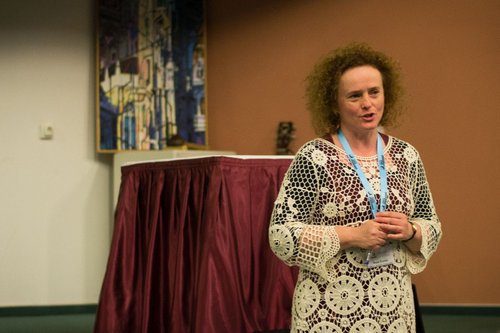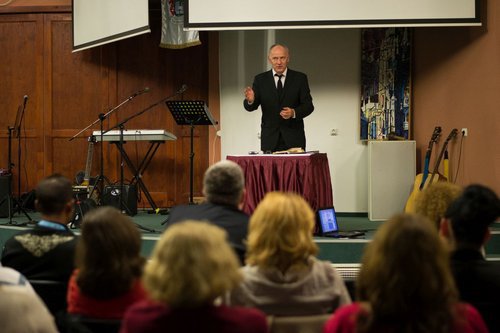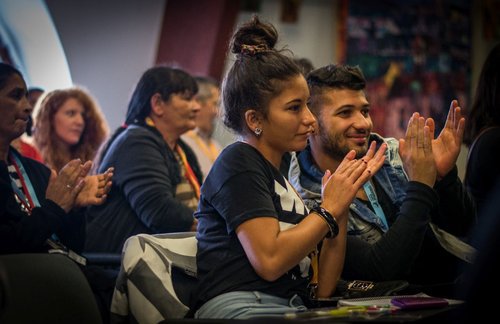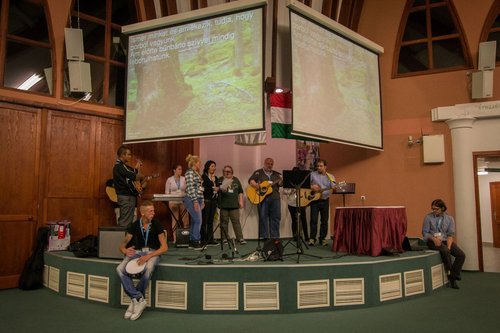Between the 25th and 27th of September, the Reformed Church in Hungary held a National Roma Mission Conference titled “You blessed us, You redeemed us, You welcomed us into your country.” The conference was supported by the Church of Rhinland, one of our most important partner church in Germany.
The main topic of the conference was the connection between physical and spiritual help. Over a hundred people from congregations concerned with Roma mission came to Balatonszárszó from all over the Carpathian-basin.
Even the state admits that faith can guide us out from any hopeless situation.
The conference opened with words from Eszter Dani, head of the Mission Department of the Synod Office, and she emphasized that those who serve amongst Roma must learn about their world so that they can deepen their connection with God together.

“Faith in Christ and community life are important parts in inclusion,” said Károly Czibere, Minister of State for Social Affairs and Inclusion. Faith communities have already proved many times that they can help people break out of bad habits, and by doing so, prevent the propagation of further disadvantages in their lives. The church also provides the cohesive force missing from our current society of individualism; it has knowledge, resources, and experience, and it gives hope to millions every day. Due to this, the government is ready and willing to cooperate with the church.
The Secretary of State also recognized the efforts of the Roma Mission within the church, because by the mission “paying attention to others, helping to connect different communities and exchange of experiences have been started.” He stressed that humility is essential and the solution of nationwide problems should be based on understanding the local problems first.
Bishop István Szabó and artist Tibor Balogh encouraged everyone to be brave
Bishop István Szabó, Ministerial President of the Synod, emphasized in the opening worship that “we are all friends of Jesus.” He based his words about courage on Mark 15:42-47 and called us all to be as brave as Joseph of Arimathea who went to Pilate, when we address the enemies of Jesus.

The bishop also stressed that people of faith live by faith and don’t need to reach higher and higher in their achievements, God has already accepted us all through Jesus. “Our reconciliation with Him is at the bottom of God’s heart. Taste His blessing and let yourself be strengthened by it!” he finished.
Tibor Balogh, Roma graphic designer and painter, also shared his thoughts on courage. According to him, “the most important is what is in our heart,” but we should also have a little fear about, “how we’ll fill the canvas.” While presenting his painting, “Roma boy with a construction,” he warned us that we can’t let our instincts direct us, which can sometimes lead to damage. In our actions we must make thought-out and well-constructed choices.
Tamás Hajnáczky, Secretary of Roma Affairs of Károli Gáspár University, talked about the fact that there are 12 courses on the Roma at the university. He spoke about the creation of a Church and Society Research Institution, where they work together with the Department of Romology in Pécs. He also mentioned that they started a Lovari language course, and that everyone at the Faculty of Teacher Training has to take a Romology course.
The participants got to know one another through interactive games and workshops

Getting to know one another was an important part of the conference. Szabina Sztojka, a colleague of the Roma Mission, led an interactive game that helped to create a sense of unity between the participants, who represented communities from all over the Carpathian-basin. “The goal was to get to know one another and to laugh together,” explalined Szabina after the game. The next day the work of different worship groups, teams working with children, and mission leaders became clearer to others through workshops.
Deacon Virág Kábai and sociologist Tímea Lácziné Somogyi, in their presentation “Spirituality and social work,” talked about how, besides looking at things from our own perspective, we must strive to see things from Jesus’ point of view. From that lens we are more likely to notice that people everywhere need pastoral care, not simply physical help. The duo also talked about their experiences in the segregated neighborhood of Kecskemét, where they run the Panicselló play centre caring for mothers and children between the ages of 0-4.
Praising God with all our hearts
On the last day, 3 of our Roma brothers and sisters shared their testimonies. A young man talked about how God saved him from suicide many times, a woman shared how her dream of 10 years – having a house with a bathroom – finally came true, and a young girl talked about the great power of God in her story – she was paralyzed by a seizure, but thanks to God she recovered and walk again.

At the closing worship, Ágnes Nyeső, National Roma Mission Coordinator, talked about the story of the prodigal son and warned us that a life without God brings nothing but failure. She reminded us that God waits for us, and when He sees us he knows us, runs to us, and tells us that we have a place in His home. She emphasized that God welcomes us because we are His. God thinks of us as His children, and we must look at one another the same way. She stressed to those present that God doesn’t want to stop at aid, He invites us all into His home.
Text: Krisztina Balogh – Krisztina Naszádi
Translation: Melinda Kara
Photo: Eszter Asszonyi